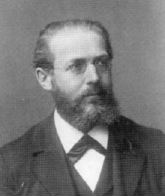

Georg Frobenius briefly attended the University of Göttingen, but he only studied there for one semester before returning to the city of his birth, Berlin.
At the University of Berlin he attended lectures by Kronecker, Kummer and Weierstrass. He continued to study there for his doctorate, attending the
seminars of Kummer and Weierstrass, and he received his doctorate in 1870, supervised by Weierstrass. He taught at the secondary school level for several years. Then, in 1874 he was appointed to the University of Berlin as an extraordinary professor of mathematics, and in 1875 he became an ordinary professor at the Eidgen&oouml;ssische Polytechnikum.
For seventeen years, between 1875 and 1892, Frobenius worked in Zürich.
Weierstrass and Fuchs list 15 topics on which Frobenius had made major contributions during these years: the development of analytic functions in series, the algebraic solution of equations whose coefficients are rational functions of one variable, the theory of linear differential equations, Pfaff's problem, linear forms with integer coefficients, linear substitutions and bilinear forms, adjoint linear differential operators, the theory of elliptic and Jacobi functions, the relations among the 28 double tangents to a plane of degree 4, Sylow's theorem, double cosets arising from two finite groups, Jacobi's covariants, Jacobi functions in three variables, the theory of biquadratic forms, and the theory of surfaces with a differential parameter.
In his work in group theory, Frobenius combined results from the theory of algebraic equations, geometry, and number theory, which led him to the study of abstract groups. He published a paper in 1879, which looks at permutable elements in groups. This paper also gives a proof of the structure theorem for finitely generated abelian groups. In 1884, he published his next
paper on finite groups in which he proved Sylow's theorems for abstract groups . The proof which Frobenius gives is the one still used today in most undergraduate courses.
Then Frobenius filled the chair at the University of Berlin that became vacant when Kronecker died. He did great work there, but he did not get along with his colleagues. He was known for giving fast-paced, varied, and deep lectures that were not terribly stimulating.
He continued his investigation of conjugacy classes in groups which would prove important in his later work on characters. It was in the year 1896, however, when Frobenius was professor at Berlin that his really important work on groups began to appear. In that year he published 5 papers on group theory and one of them on group characters is of fundamental importance.
Over the years 1897-1899 Frobenius published 2 papers on group representations, one on induced characters, and one on tensor product of characters. In
1898 he introduced the notion of induced representations and the Frobenius Reciprocity Theorem. It was a burst of activity which set up the foundations of
the whole of the machinery of representation theory.
In 1896, Frobenius gave the irreducible characters for the alternating groups A4, A5, the symmetric groups S4 , S5 and the
group PSL(2,7). He completely determined the characters of symmetric groups in 1900 and of characters of alternating groups in 1901,
publishing definitive papers on each. He continued his applications of character theory in papers of 1900 and 1901 which studied the structure of Frobenius groups.
Frobenius had a number of doctoral students who made important contributions to mathematics. These included Edmund Landau who was awarded his
doctorate in 1899, Issai Schur who was awarded his doctorate in 1901, and Robert Remak who was awarded his doctorate in 1910. Frobenius collaborated
with Schur in representation theory of groups and character theory of groups.
Among the topics which Frobenius studied towards the end of his career were positive and non-negative matrices. He introduced the concept of irreducibility
for matrices, and the papers which he wrote containing this theory around 1910 remain today the fundamental results in the discipline. The fact so many of
Frobenius's papers read like present day text-books on the topics which he studied is a clear indication of the importance that his work.